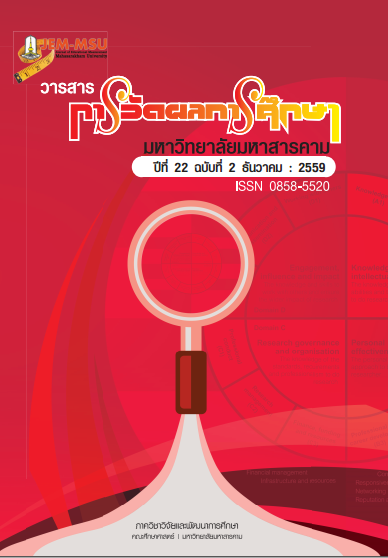Results of Application of Web-Based WebQuest Lessons Together with WebBlogs that Promote Critical Thinking Ability in the Information Technology and Communication Class for Mathayomsuksa 3
Main Article Content
Abstract
In organizing quality instructional activities and emphasizing learner-centeredness,
the teacher must organize the activities to develop the learners so as to have knowledge
and ability, be reasonable, have critical thinking, know how to solve problems, and be able
to worthily apply the knowledge in their daily life. The research aimed to : 1) develop webbased WebQuest lessons together with WebBlogs that promote critical thinking ability of
Mathayomsuksa 3 students so as to meet the preset criterion of 85/85 ; 2) study the
effectiveness index of the web-based WebQuest lessons together with WebBlogs that
promote critical thinking ability of Mathayomsuksa 3 students that were developed ; 3)
compare the learning achievements and critical thinking ability of the students who learned
with the web-based WebQuest lessons together with WebBlogs, with normal learning
management ; and 4) find the satisfaction of the students with the web-based WebQuest
lessons together with WebBlogs that promote critical thinking ability. The sample comprised
80 students from 2 groups, 40 from each, of Mathayomsuksa 3 students of Kudchum
witayakom School, Office of Secondary Education Service Area 28, Sisaket - Yasothon, in the
2nd semester of the academic year 2014, obtained through cluster random sampling,
followed by drawing lots for the two groups ; the group that obtained number one was to
use the web-based WebQuest lessons together with WebBlogs while the other group was to
learn in the normal learning management. The instruments used were : 1) web-based
WebQuest Lessons together with WebBlogs and normal learning management ; 2) a learning
achievement test with the difficulty index ranging from .20 to .70, the discrimination power
from .36 to .78, and the total reliability of .94 ; 3) a critical thinking test with the total reliability
of .95 ; 4) a questionnaire for students’ satisfaction with the web-based WebQuest lessons
together with WebBlogs with the discrimination power from .29 to .79, and the total
reliability of .84. The statistics employed in the analysis of data were percentage, the mean,
standard deviation, and Hotelling-T2 were used in the hypothesis testing.
The results are as follows :
1. The web-based WebQuest lessons together with WebBlogs, constructed by
the author, had the efficiency of 88.69/87.33 which was higher than the 85/85 preset
criterion.
2. The effectiveness index of the web-based WebQuest lessons together with
WebBlogs in the Information Technology and Communication course for Mathayomsuksa 3
was 0.7813 which means that the students had the learning progress of 78.13 percent.
3. The students who studied with the web-based WebQuest lessons together
with WebBlogs, compared with the students who studied in the normal learning management,
had different learning achievements and critical thinking ability, with statistical significance
at the .01 level.
4. The students’ satisfaction with the web-based WebQuest lessons together
with WebBlogs, on the whole and by item, was in the high level.
In conclusion, the web-based WebQuest lessons together with WebBlogs, and the
students who learned with normal lessons in the Information Technology and Communication
course for Mathayomsuksa 3 that were developed had suitable efficiency and effectiveness,
and teachers should be promoted and supported to be able to implement them to further
develop students’ higher learning achievements and critical thinking ability.
Article Details
The content and information contained in the published article in the Journal of Educational Measurement Mahasarakham University represent the opinions and responsibilities of the authors directly. The editorial board of the journal is not necessarily in agreement with or responsible for any of the content.
The articles, data, content, images, etc. that have been published in the Journal of Educational Measurement Mahasarakham University are copyrighted by the journal. If any individual or organization wishes to reproduce or perform any actions involving the entirety or any part of the content, they must obtain written permission from the Journal of Educational Measurement Mahasarakham University.


